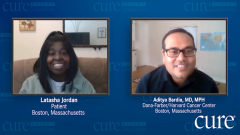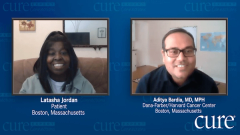
Social Support Systems for Patients With TNBC
A triple-negative breast cancer (TNBC) survivor, Latasha Jordan, considers the positive impact her support network has had on her treatment; and Aditya Bardia, M.D., MPH, emphasizes the importance of social support systems for patients with TNBC.
Episodes in this series

Aditya Bardia, M.D., MPH: The management of metastatic breast cancer has changed in the past few years. Previously, it was just chemotherapy. But now for the PD-L1 [programmed death-ligand 1]–positive subgroup, it’s chemotherapy plus immunotherapy. In the second-line setting and beyond, it’s Trodelvy [sacituzumab govitecan]. There is also ongoing research looking at combination therapy—combining Trodelvy with immunotherapy, other targeted agents, newer antibody-drug conjugates. So there is a lot of promise and a lot of ongoing research in that area to control metastatic breast cancer.
That’s from a drug perspective, which is one component of management. The other component is the team—the physician, the nurse practitioner, the physician assistant, and if you’re in a trial, the research team. Then, the third component is the social support. Can you tell us about your social support, caregivers? How was that important, and how has that helped you throughout your journey, from your initial diagnosis to treatment for metastatic breast cancer?
Latasha Jordan: I definitely had support coming from everywhere. There wasn’t a person who I couldn’t count on, even my son. I know this is not about my son, but it is. What I didn’t want for my child was for him to look at me and say, “My mom has cancer. Is she going to die?” I didn’t want him to not finish college. I didn’t want him to use me as an excuse to not push forward with his future. I said to my son, “OK, this situation is in our lives, but I still want you to be who you were before this happened. This doesn’t stop anything. I’m going to be fine. I’m going to live for as long as God allows me to. We’re not going to think about death. We’re not going to think about anything. We’re going to think about you doing what you have to do and being there for me when I need you to be there for me.” He finished college. He earned his bachelor’s degree in business management.
My mom was also there for me. I remember there was a time when I couldn’t even take a shower. I needed someone to help me. My mom’s in her 70s. She had to give me a shower. It’s funny now. My mom and I were already close, but this just made us closer. “Oh mom, you have to give me a shower. I’m so tired. I really cannot give myself a shower.” It took a lot for me to even tell her that. I tried to do everything by myself before I had to tell people I love that I was really suffering when trying to do things on my own. I felt like I was a baby again. We laugh about that now; I was like, “You really have to baby me again.”
Everyone has been so supportive. I don’t think I would’ve ever been able to do it. God first, and then everyone else. Perfect life. Perfect.
Aditya Bardia, M.D., MPH: It’s so critical to have this support system, and I’m sure your mom understood why you were asking for help. Thanks for highlighting this point. Sometimes it’s something that does not get highlighted enough. I think that is a critical component. It’s not just the drugs; it’s not just the team. It is also the social network. This third leg is critical. When these three things align, that’s when you can have success like you’ve had, Latasha, in terms of being supported, being able to do things that are important to you. I would encourage oncologists to discuss this with their patients. We need to understand the social support system, not just the drugs and the tumor biology. Most institutions provide additional support with social workers and patient navigators. I think that’s critical in terms of being a member of the team.
Transcript edited for clarity.





